人教版新目标八年级上册Unit_9_Can_you_come_to_my_party_Section_A_2
人教新目标八年级英语上册Unit9Canyoucometomyparty?知识点归纳

人教新目标八年级英语上册Unit9Canyoucometomyparty?知识点归纳人教新目标八年级英语上册Unit 9 Can you come to my party?知识点归纳知识点prepare for为……做准备go to the doctor去看医生have the flu患感冒help my parents帮助我的父母come to the party来参加聚会another time其他时间last fall去年秋天go to the party去聚会hang out常去某处;泡在某处the day after tomorrow后天the day before yesterday前天have a piano lesson上钢琴课look after照看;照顾accept an invitaton接受邀请turn down an invitation拒绝邀请take a trip去旅行at the end of this month这个月末look forward to盼望;期待the opening of………的开幕式/落成典礼reply in writing书面回复go to the concert去听音乐会not…until直到……才meet my friend会见我的朋友visit grandparents拜访祖父母study for a test为考试学习have to不得不too much homework太多作业do homework 做家庭作业go to the movies去看电影after school放学后on the weekend 在周末invite sb. to do sth.邀请某人做某事what引导的感叹句结构:What+a/an+adj.+可数名词单数(+主语+谓语)!What+adj.+名词复数/不可数名词(+主语+谓语)!help sb.(to)do sth.帮助某人做某事be sad to do sth.做某事很悲伤see sb. do sth. see sb.doing sth.the best way to do sth.做某事最好的方式have a surprise party for sb.为某人举办一个惊喜派对look forward to doing sth.期盼做某事reply to sth./sb.答复某事/某人What’s today?今天是什么日子?What’s the date today? What day is it today?一、知识点解析。
人教版新目标版八年级英语上册 Unit 9 Can you come to my party?单元知识归纳
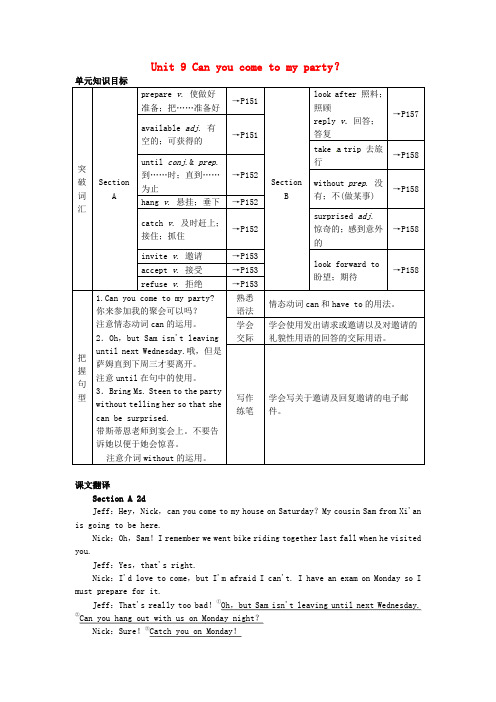
Unit 9 Can you come to my party?突破词汇SectionAprepare v. 使做好准备;把……准备好→P151SectionBlook after 照料;照顾reply v.回答;答复→P157 available adj. 有空的;可获得的→P151take a trip 去旅行→P158 until conj.& prep.到……时;直到……为止→P152without prep. 没有;不(做某事)→P158hang v. 悬挂;垂下→P152catch v. 及时赶上;接住;抓住→P152surprised adj.惊奇的;感到意外的→P158invite v. 邀请→P153look forward to盼望;期待→P158 accept v. 接受→P153refuse v. 拒绝→P153把握句型1.Can you come to my party?你来参加我的聚会可以吗?注意情态动词can的运用。
2.Oh,but Sam isn't leavinguntil next Wednesday.哦,但是萨姆直到下周三才要离开。
注意until在句中的使用。
3.Bring Ms. Steen to the partywithout telling her so that shecan be surprised.带斯蒂恩老师到宴会上。
不要告诉她以便于她会惊喜。
注意介词without的运用。
熟悉语法情态动词can和have to的用法。
学会交际学会使用发出请求或邀请以及对邀请的礼貌性用语的回答的交际用语。
写作练笔学会写关于邀请及回复邀请的电子邮件。
课文翻译Section A 2dJeff:Hey,Nick,can you come to my house on Saturday?My cousin Sam from Xi'an is going to be here.Nick:Oh,Sam!I remember we went bike riding together last fall when he visited you.Jeff:Yes,that's right.Nick:I'd love to come,but I'm afraid I can't. I have an exam on Monday so I must prepare for it.Jeff:That's really too bad!①Oh,but Sam isn't leaving until next Wednesday.②Can you hang out with us on Monday night?Nick:Sure!③Catch you on Monday!杰夫:嘿,尼克,星期六你能来我家吗?我来自西安的表弟萨姆打算到这儿。
人教版新目标八年级上册Unit9-Can-you-come-to-my-part1
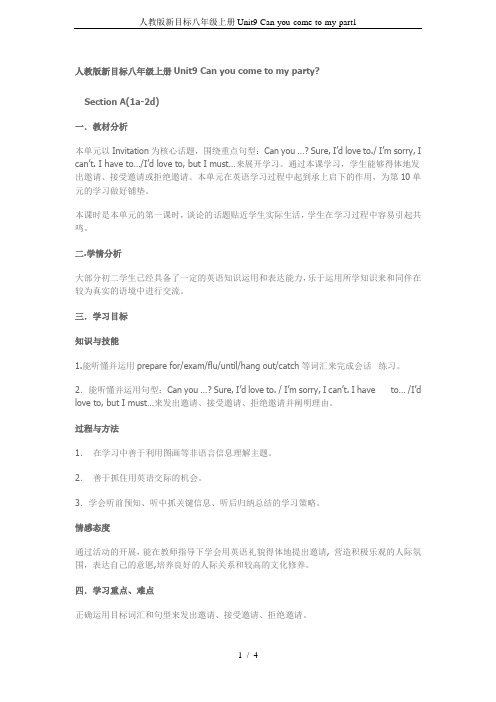
人教版新目标八年级上册Unit9 Can you come to my party?Section A(1a-2d)一.教材分析本单元以Invitation为核心话题,围绕重点句型:Can you …? Sure, I’d love to./ I’m sorry, I can’t. I have to…/I’d love to, but I must…来展开学习。
通过本课学习,学生能够得体地发出邀请、接受邀请或拒绝邀请。
本单元在英语学习过程中起到承上启下的作用,为第10单元的学习做好铺垫。
本课时是本单元的第一课时,谈论的话题贴近学生实际生活,学生在学习过程中容易引起共鸣。
二.学情分析大部分初二学生已经具备了一定的英语知识运用和表达能力,乐于运用所学知识来和同伴在较为真实的语境中进行交流。
三.学习目标知识与技能1.能听懂并运用prepare for/exam/flu/until/hang out/catch等词汇来完成会话练习。
2.能听懂并运用句型:Can you …? Sure, I’d love to. / I’m sorry, I can’t. I have to… /I’d love to, but I must…来发出邀请、接受邀请、拒绝邀请并阐明理由。
过程与方法1.在学习中善于利用图画等非语言信息理解主题。
2.善于抓住用英语交际的机会。
3.学会听前预知、听中抓关键信息、听后归纳总结的学习策略。
情感态度通过活动的开展,能在教师指导下学会用英语礼貌得体地提出邀请, 营造积极乐观的人际氛围,表达自己的意愿,培养良好的人际关系和较高的文化修养。
四.学习重点、难点正确运用目标词汇和句型来发出邀请、接受邀请、拒绝邀请。
五.教学手段多媒体六.教学过程Step1. Warming-upPlay a game named hot potato. Ask students to pass on a ball. The ball is made of several pieces of paper. Play a piece of music. When music stops, the students with the ball peels the paper, read the task on the paper and finish it. On t he last piece of paper, there’s something about the topic of this class—party. Today, let’s learn something more about party.(设计意图:通过一个热身活动,在拉近师生距离、了解学生学情的同时,导入到本节课的课题。
人教版八年级英语上册Unit9_can_you_come_to_my_party_section_A

2._h_a_v_e__th__e_f_lu__ available. I have too
much homework this
3.g_o__to__th__e_d_o_c_t_or weekend.
A: That’s too bad.
4. _p_r_e_p_a_r_e_f_o_r_a_n Maybe another time.
MON. prepare for a test
TUE. WED. THUR. FRI.
have a piano lesson visit my aunt do my homework
Wilson
1c You are the students in the picture. Student A, invite three students to your party. Student B, C and D, give answers.
A: Can you come to my party on Saturday afternoon? B: Sure, I’d love to. C: Sorry, I can’t. I have to prepare for an exam. D: I’m sorry, too. I must go to the doctor.
Can you come to my party?
Jim
have a party ask his friends to come to the party 邀请 =invite his friends to the party.
Can his friends come to the party? Sure, I’d love to. Of course/ Sure, I’d love to.
人教版新目标八年级上册Unit_9_Can_you_come_to_my_party_Section_A_2

3. until conj. & prep. 到„„时;直到„„为止 not … until 直到„„才 e.g. Go straight down the street until you see the bank. 一直走,直到你看见银行。 He didn’t go home until he finished his work. 直到完成工作后他才回家。
10. 不,她没有空。她必须去看医生。 No, she’s ____ not _________. available She ______ must ___ go to the _______. doctor 11. 他们能去看电影吗? ____ Can they ____ go to the _______? movies 12. 不,他们没有空。他们可能必须去见朋 友。 free They _____ might _____ have No, they’re not ____. ___ to meet their ________. friends
2.I’m sorry, I’m not available. 真抱歉,我没有空。 此句中的available 表示“ 有空;不忙; 有时间交谈或聊天”, 其后还可用 to do 引 出具体的事情。例如: Are you available tomorrow morning? 明天早上你有空吗? I’m afraid I’m not available to help with the school show on the 19th. 我怕是没空来帮着准备学校19号的演出了。
lessons when I came into the office.
我进办公室时,我们的英语老师在备课。
当宾语是食物之类的东西时,可译为 “制;做 ”
人教版新目标英语八年级上册《Unit 9 Can you come to my party Sect

人教版新目标英语八年级上册《Unit 9 Can you come to my party Section B 1a-1f》教学设计5一. 教材分析人教版新目标英语八年级上册《Unit 9 Can you come to my party Section B 1a-1f》主要围绕邀请朋友参加聚会这一主题展开。
通过本节课的学习,学生能够掌握情态动词can的用法,询问和回答能否参加某个活动,同时学会如何礼貌地拒绝邀请。
本节课的内容与学生的生活紧密相连,有利于激发他们的学习兴趣和参与度。
二. 学情分析八年级的学生已经具备一定的基础英语知识,对于情态动词的用法有一定的了解。
但在实际运用中,部分学生可能会存在发音不准确、句子结构混乱等问题。
因此,在教学过程中,需要关注学生的个体差异,充分调动他们的积极性,提高他们的口语表达能力和交际能力。
三. 教学目标1.知识目标:–掌握情态动词can的用法,能够正确询问和回答能否参加某个活动。
–学会如何礼貌地拒绝邀请。
2.能力目标:–提高学生的口语表达能力和交际能力。
–培养学生的团队合作精神。
3.情感目标:–增强学生对英语学习的兴趣。
–培养学生热爱生活、积极参与社交活动的态度。
四. 教学重难点•情态动词can的用法。
•询问和回答能否参加某个活动的句子结构。
•如何在实际交际中运用所学知识。
•礼貌地拒绝邀请的表达方式。
五. 教学方法1.情境教学法:通过设置真实的社交场景,让学生在实际环境中运用所学知识。
2.交际法:引导学生进行角色扮演、小组讨论等互动活动,提高口语表达能力。
3.任务型教学法:设计具有实际意义的学习任务,让学生在完成任务的过程中巩固知识。
六. 教学准备1.教学材料:人教版新目标英语八年级上册教材、多媒体设备。
2.教学辅助工具:PPT、录音机、磁带、挂图等。
3.教学资源:网络资源、现实生活中的聚会场景图片等。
七. 教学过程1.导入(5分钟)–教师通过提问方式引导学生回顾已学过的情态动词,为新课的学习做好铺垫。
人教新目标八年级上册英语《Unit 9 Can you come to my party?》Sect
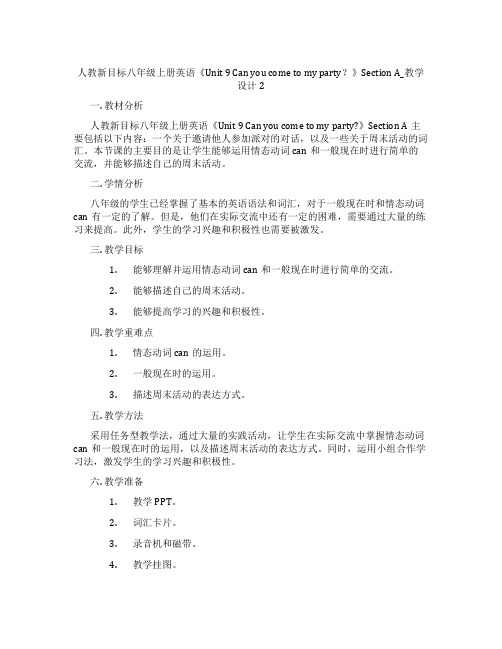
人教新目标八年级上册英语《Unit 9 Can you come to my party?》Section A_教学设计2一. 教材分析人教新目标八年级上册英语《Unit 9 Can you come to my party?》Section A主要包括以下内容:一个关于邀请他人参加派对的对话,以及一些关于周末活动的词汇。
本节课的主要目的是让学生能够运用情态动词can和一般现在时进行简单的交流,并能够描述自己的周末活动。
二. 学情分析八年级的学生已经掌握了基本的英语语法和词汇,对于一般现在时和情态动词can有一定的了解。
但是,他们在实际交流中还有一定的困难,需要通过大量的练习来提高。
此外,学生的学习兴趣和积极性也需要被激发。
三. 教学目标1.能够理解并运用情态动词can和一般现在时进行简单的交流。
2.能够描述自己的周末活动。
3.能够提高学习的兴趣和积极性。
四. 教学重难点1.情态动词can的运用。
2.一般现在时的运用。
3.描述周末活动的表达方式。
五. 教学方法采用任务型教学法,通过大量的实践活动,让学生在实际交流中掌握情态动词can和一般现在时的运用,以及描述周末活动的表达方式。
同时,运用小组合作学习法,激发学生的学习兴趣和积极性。
六. 教学准备1.教学PPT。
2.词汇卡片。
3.录音机和磁带。
4.教学挂图。
七. 教学过程1.导入(5分钟)通过播放一段关于派对的音频,引导学生谈论派对,激发学生的学习兴趣。
2.呈现(10分钟)利用PPT展示本节课的主要内容,包括对话和词汇。
让学生跟读对话,熟悉词汇。
3.操练(15分钟)将学生分成小组,每组分配一张词汇卡片,让学生用情态动词can和一般现在时进行交流,描述卡片上的词汇。
教师巡回指导,纠正发音和语法错误。
4.巩固(10分钟)让学生在小组内互相提问,用情态动词can和一般现在时描述自己的周末活动。
教师巡回指导,纠正发音和语法错误。
5.拓展(10分钟)让学生自由发挥,用情态动词can和一般现在时编写一段对话,描述自己和他的朋友的周末活动。
新人教版八年级英语上册Unit_9_Can_you_come_to_my_party?__Self check

(2)这4个情态动词在一般疑问句中将它们
放在句首, 在否定句中直接在他们后边加not
即可。
我们以can为例: Can he go with us? 他能和我们一起去吗? He can’t go with us.
他不能和我们一起去。
而“have to”要句。
2. I have to help my parents. 我不得不帮助我的父母。 help sb. with sth. 或help sb. (to) do sth. 上一句我们可以说: I have to help my parents with the housework. 或说I have to help my parents (to) do the housework.
Unit 9
Explanation
1. 情态动词“have to”与其他的情态动词如: “can” “may” “must”和 “should” 不同。 (1)这4个情态动词没有人称的变化,而 have to有。它的第三人称单数为“has to” 如:
He should study hard. 他应该好好学习。 He has to study hard. 他不得不好好学习。
A. am not A. on B. can't B. at C. don't C. in
A 3. What are you doing _____ Monday morning?
4. Thanks for _______ me to the party. B A. ask B. asking C. asks 5. Bob can’t come out to play because he C _________ help Dad in the garden. A. can B. can’t C. has to 6. —Would you like a cup of coffee? B —____________. A. No, I don’t want C. I don’t like it B. No, thank you
2013人教版新目标英语八年级上unit_9_can_you_come_to_my_party_Section_B-2a-2e
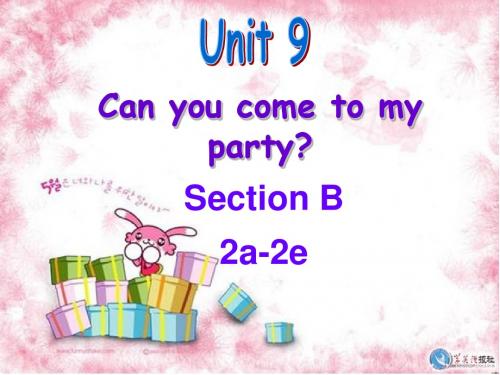
Message 3
1. invitation n. 邀请;请柬 preparation n. 准备;准备工作
动词+ ion (后缀)→invitation 动词+ ion (后缀)→ preparation e.g. She didn’t accept my invitation. 她没有接受我的邀请。 He didn’t do any preparation for this exam, so he failed. 他考试前没做任何准备,所以不及格。
is the best way to say “Thank you and
goodbye.” I can help to buy some of the food
and drinks. I can help to bring MS. Steen
to the party. I already have a great idea
Message New Rely Forward Delete Print Move to 1 Hi David, What a great idea! I really like Ms. Steen a lot. She helped me to improve my English so much. I’m sad to see her go, and this party
7. sad adj. (令人)悲哀的; (令人)难过的 e.g. She was very sad when her cat died.
她的猫死后,她很悲伤。 8. glad adj. 高兴;愿意 e.g. I am glad that you can come. 你能来我很高兴。
9. goodbye interj. & n. 再见 e.g. She said goodbye and walked away. 她说了再见就走了。
人教版新目标英语八年级上册《Unit 9 Can you come to my party Sect
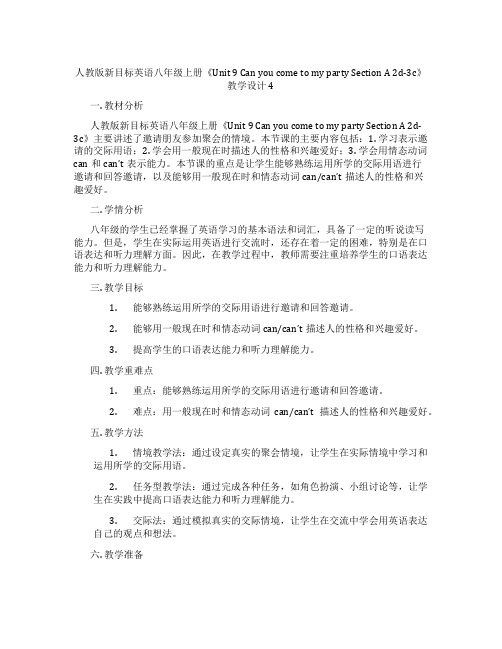
人教版新目标英语八年级上册《Unit 9 Can you come to my party Section A 2d-3c》教学设计4一. 教材分析人教版新目标英语八年级上册《Unit 9 Can you come to my party Section A 2d-3c》主要讲述了邀请朋友参加聚会的情境。
本节课的主要内容包括:1. 学习表示邀请的交际用语;2. 学会用一般现在时描述人的性格和兴趣爱好;3. 学会用情态动词can和can’t表示能力。
本节课的重点是让学生能够熟练运用所学的交际用语进行邀请和回答邀请,以及能够用一般现在时和情态动词can/can’t描述人的性格和兴趣爱好。
二. 学情分析八年级的学生已经掌握了英语学习的基本语法和词汇,具备了一定的听说读写能力。
但是,学生在实际运用英语进行交流时,还存在着一定的困难,特别是在口语表达和听力理解方面。
因此,在教学过程中,教师需要注重培养学生的口语表达能力和听力理解能力。
三. 教学目标1.能够熟练运用所学的交际用语进行邀请和回答邀请。
2.能够用一般现在时和情态动词can/can’t描述人的性格和兴趣爱好。
3.提高学生的口语表达能力和听力理解能力。
四. 教学重难点1.重点:能够熟练运用所学的交际用语进行邀请和回答邀请。
2.难点:用一般现在时和情态动词can/can’t描述人的性格和兴趣爱好。
五. 教学方法1.情境教学法:通过设定真实的聚会情境,让学生在实际情境中学习和运用所学的交际用语。
2.任务型教学法:通过完成各种任务,如角色扮演、小组讨论等,让学生在实践中提高口语表达能力和听力理解能力。
3.交际法:通过模拟真实的交际情境,让学生在交流中学会用英语表达自己的观点和想法。
六. 教学准备1.教学课件:制作课件,包括文本、图片、音频和视频等,以便于展示和引导学生学习。
2.教学道具:准备一些与聚会相关的道具,如气球、蛋糕等,以便于创设情境。
3.教学材料:准备一些关于人物性格和兴趣爱好的图片和资料,以便于学生进行描述。
人教新目标八年级上册英语《Unit 9 Can you come to my party?》Sect

人教新目标八年级上册英语《Unit 9 Can you come to my party?》Section A_教案3一. 教材分析人教新目标八年级上册英语《Unit 9 Can you come to my party?》Section A,主要讲述了一个关于邀请朋友参加派对的对话。
本节课主要学习一般现在时的疑问句和回答,以及情态动词can的用法。
通过本节课的学习,学生能够听懂、会说、会读本节课的主要单词和句型,并能运用所学知识进行实际交流。
二. 学情分析八年级的学生已经掌握了基本的英语语法和词汇,对于一般现在时和情态动词有一定的了解。
但部分学生在发音和听力方面还存在困难,需要老师在教学中给予关注和指导。
同时,学生对于实际生活中的邀请和回复还不够熟悉,需要通过本节课的学习来提高这方面的交际能力。
三. 教学目标1.能够正确听懂、说出一般现在时的疑问句和回答。
2.能够熟练运用情态动词can提问和回答。
3.能够运用所学知识进行实际邀请和回复的交流。
4.提高学生的听说能力和团队协作能力。
四. 教学重难点1.一般现在时的疑问句和回答。
2.情态动词can的用法。
3.实际生活中的邀请和回复。
五. 教学方法1.任务型教学法:通过设置不同的任务,让学生在实际操作中运用所学知识。
2.情境教学法:创设生活情境,让学生在真实的环境中学习英语。
3.互动式教学法:引导学生积极参与课堂活动,提高课堂氛围。
六. 教学准备1.教学课件:制作课件,包括本节课的主要单词、句型和听力材料。
2.教学道具:准备一些与派对相关的道具,如气球、蛋糕等。
3.录音机和磁带:准备听力材料的相关录音机和磁带。
七. 教学过程1.导入(5分钟)利用录音机播放一段派对的场景录音,引导学生谈论派对相关的话题,激发学生的学习兴趣。
2.呈现(10分钟)老师通过课件展示本节课的主要单词和句型,如:balloon, cake, can you come to my party? 等,并引导学生跟读。
人教版新目标八年级上课件、教案Unit9Unit 9 Can you come to my

Unit 9 Can you come to my party?Section A 1 (1a-2d)一、教学目标:1. 语言知识目标:1) 能掌握以下单词:prepare, prepare for, exam, flu, available, another time, until, hang, hang out, catch2) 能掌握以下句型:①—Can you come to my party on Saturday afternoon?—Sure, I’d love to.②—Can you go to the movies on Saturday?—I’m sorry, I’m not available. I have too much homework this weekend.③That’s too bad. Maybe another time.④Sure. Thanks for asking.⑤Sam isn’t leaving until next Wednesday.2) 能了解以下语法:用情态动词can来表达邀请。
3)学会表达邀请,学会对邀请进行恰当的答复或拒绝。
2. 情感态度价值观目标:学会人际交往的基本常识,学会有礼貌地邀请别人以及回答别人的邀请的方式。
理解“义务”涵义,学会承担自己应尽的义务,能够在班级以及社会生活中担当一定的责任。
理解人与人之间的真情,学会珍惜朋友之间、师生之间的友情。
二、教学重难点1. 教学重点:1) 运用所学提出邀请,接受邀请和拒绝邀请。
2) 正确使用can, might, must 等情态动词。
2. 教学难点:1) 扎实掌握重点词汇和表示邀请的句型并能灵活运用。
2) 通过听力练习和小组合作,理解并能提出邀请并作肯定回答。
三、教学过程Ⅰ. Lead-in1. 在大屏幕上向学生展示一张邀请函。
T: Hello, everyone! Yesterday I received an invitation letter from my dear friend; she invited me to go to her Halloween party. But I have something important to do. I’m studying for a test. I don’t know what to do. What should I say? Can you help me?…2. Ss try to answer the questions.Ⅱ. Presentation1. 引导学生们看大屏幕上邀请及两个答语。
人教新目标八年级上册英语《Unit 9 Can you come to my party?》Sect

人教新目标八年级上册英语《Unit 9 Can you come to my party?》Section B_教案3一. 教材分析人教新目标八年级上册英语《Unit 9 Can you come to my party?》Section B 主要围绕邀请朋友参加聚会展开。
本节课通过学习一般现在时的特殊疑问句及其回答,使学生能够运用所学知识进行实际交流。
本节课的内容与学生的生活紧密相连,有利于激发他们的学习兴趣和参与欲望。
二. 学情分析八年级的学生已经掌握了英语学习的基本语法和词汇,具备一定的听、说、读、写能力。
对于一般现在时的疑问句及其回答,大部分学生已经有所了解,但仍有部分学生掌握不牢固。
在导入环节,教师可以通过与学生互动,了解他们在生活中参加聚会的情景,以便更好地激发他们的学习兴趣。
三. 教学目标1.知识目标:学生能够掌握一般现在时的特殊疑问句及其回答;2.能力目标:学生能够在实际情景中运用所学知识进行交流;3.情感目标:培养学生热爱生活、积极参与社交活动的态度。
四. 教学重难点1.重点:一般现在时的特殊疑问句及其回答;2.难点:一般现在时在实际情景中的运用。
五. 教学方法采用任务型教学法、情景教学法和分组合作学习法,让学生在实际情景中感知、实践、运用语言知识,提高他们的听、说、读、写能力。
六. 教学准备1.教具:多媒体课件、黑板、粉笔;2.教材:人教新目标八年级上册英语《Unit 9 Can you come to myparty?》Section B;3.辅助材料:与本节课相关的生活场景图片、活动卡片等。
七. 教学过程1.导入(5分钟)教师通过提问学生:“Do you like parties? Why?”引导学生谈论聚会话题,激发他们的学习兴趣。
同时,教师板书课题《Can you come to my party?》,引入新课。
2.呈现(10分钟)教师利用多媒体课件展示一组聚会场景图片,引导学生观察并回答问题:“What are they doing? Can you come to my party?”学生根据图片内容和已学知识进行回答。
人教新目标八年级上册英语《Unit 9 Can you come to my party?》Sect

人教新目标八年级上册英语《Unit 9 Can you come to my party?》Section A_教案1一. 教材分析本节课为人教新目标八年级上册英语《Unit 9 Can you come to my party?》Section A。
本节课主要围绕邀请朋友参加聚会这一主题,学习一般现在时的疑问句和回答,以及情态动词can的用法。
通过本节课的学习,学生能够听懂、会说、会写本节课的重点单词和句型,并能够运用所学知识进行实际交流。
二. 学情分析八年级的学生已经具备了一定的英语基础,对于一般现在时和情态动词有一定的了解。
但是,学生在口语表达和听力理解方面还存在一定的问题,需要通过大量的练习来提高。
此外,学生对于如何运用英语进行实际交流还不够熟练,需要通过情景模拟和角色扮演等方式来进行锻炼。
三. 教学目标1.知识目标:学生能够掌握本节课的重点单词和句型,理解一般现在时的疑问句和回答,以及情态动词can的用法。
2.能力目标:学生能够听懂、会说、会写本节课的内容,并能够运用所学知识进行实际交流。
3.情感目标:学生能够积极参与课堂活动,提高学习英语的兴趣。
四. 教学重难点1.重点:一般现在时的疑问句和回答,以及情态动词can的用法。
2.难点:一般现在时的疑问句和回答的构成和用法,情态动词can的用法。
五. 教学方法本节课采用任务型教学法,通过情景模拟、角色扮演、小组合作等方式,让学生在实际语境中运用所学知识,提高学生的听、说、读、写能力。
六. 教学准备1.教师准备:准备好本节课的PPT,编写相关的练习题和听力材料。
2.学生准备:预习本节课的内容,熟记重点单词和句型。
七. 教学过程1.导入(5分钟)教师通过提问学生喜欢的活动,引导学生谈论聚会的话题,从而引入本节课的主题。
2.呈现(10分钟)教师通过PPT展示本节课的重点单词和句型,并用简单的解释和例子来帮助学生理解。
3.操练(10分钟)教师学生进行小组活动,让学生用英语进行自我介绍,并邀请同学参加聚会。
最新人教版八年级英语上册Unit_9_can_you_come_to_my_party_Sect

最新人教版八年级英语上册Unit_9_can_you_come_to_my_party_Sect Learningaim&keypoint群学P651.为考试做准备prepareforane某am某prepare2.我不得不为考试做准备。
独学P67invite11.然后邀请同学来你的派对。
Theninviteclamateaccepttoyourparty.refueP68thedaybeforeyeterdayt hedayaftertomorrowweekdaylookafter12.照顾他的姐姐lookafterhiiter是做好准备;把…准备好v.为…做准备考试n.流行性感冒;流感n.有空的;可获得的n.其他时间;别的时间到…时;直到…为止conj./prep.悬挂;垂下v.闲逛;常去某处及时赶上;接住;抓住v.邀请v.接受v.拒绝v.前天后天工作日n.照料;照顾根据箭头指向的汉语说出英语短语。
playbaketball准备考试havetheflu去音乐去看病会playthepiano 去见gotothedoctor弹钢琴朋友helpmyparentgototheconcert打篮球得了流prepareforane某am帮父母感meetmyfriend1aMatchthephraewiththepicture(a-e).1.prepareforane某am2.helpmyparent3.gotothedoctor4.meetmyfriend5.havetheflu ______a______e______d______b______c群学1bLitenandwritethename(Tim,Kay,AnnaandWilon)ne某ttothecorrecttudentinthepicture.TimAnnaKayWilonaedbc1.prepareforane某am2.helpmyparent3.gotothedoctor4.meetmyfriend5.havetheflu 1c合作探究Youarethetudentinthepicture.StudentA,invitethreetudenttoyourparty.StudentB,CandD,giveanwer.Sure,I’dloveto.。
人教版新目标八年级上课件、教案Unit9Unit_9__Can_you_come_to_my
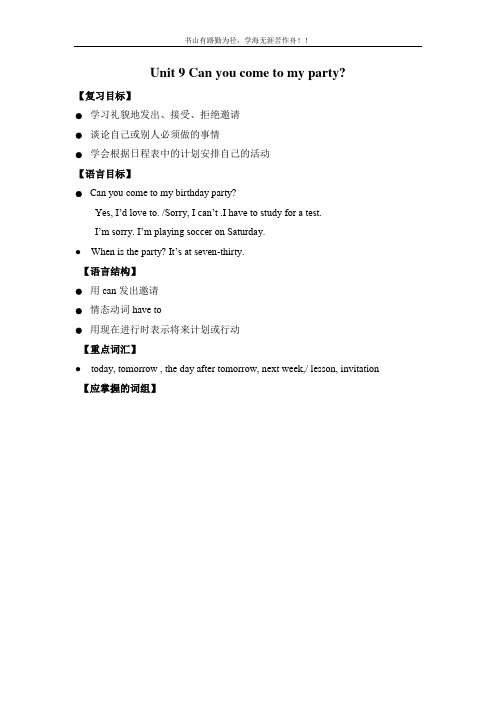
书山有路勤为径,学海无涯苦作舟!!Unit 9 Can you come to my party?【复习目标】●学习礼貌地发出、接受、拒绝邀请●谈论自己或别人必须做的事情●学会根据日程表中的计划安排自己的活动【语言目标】●Can you come to my birthday party?Yes, I’d love to. /Sorry, I can’t .I have to study for a test.I’m sorry. I’m playing soccer on Saturday.●When is the par ty? It’s at seven-thirty.【语言结构】●用can发出邀请●情态动词have to●用现在进行时表示将来计划或行动【重点词汇】● today, tomorrow , the day after tomorrow, next week,/ lesson, invitation 【应掌握的词组】书山有路勤为径,学海无涯苦作舟!!1. come to one’s party 参加某人的聚会2. on Saturday afternoon 在星期六的下午3. I’d love to 我非常乐意4. I’m sorry 对不起5. study for a test为测验而学习6. go to the doctor 去看医生7. visit one’s aunt 看望某人的姑姑8. have a piano lesson 上一堂钢琴课10. too much homework 太多家庭作业11. much too interesting 有趣得多12. maybe another time 也许下一次吧13.Thanks for asking(inviting)谢谢邀请14. go to the baseball game 参加棒球比赛15. Birthday Party 生日聚会16. go to the mall 去购物中心17. soccer practice 足球练习18. look for 寻找19. find out 找到,弄清楚,查明20. study for the math test 为数学考试而学习21. play tennis with me 和我一起打网球22. I have a really busy week 我一周很忙23. football match足球比赛24. my cousin’s birthday party 我表弟的生日聚会25. write soon 尽快回信26. study for my science test 为科学考试而学习27. 给某人打电话的几种说法:call sb. up, call sb.phone sb., phone to sb.telephone sb. telephone to sb.phone sb. up,ring sb.give sb. a ring,give sb. a phonemake a telephone call to sb.28. on Thursday night 星期四晚上29. be (go) on vacation 度假30. next week下周31. join sb.加入某人一起32. Please keep quiet! 请保持安静,keep+形容词表示“保持某种状态”,keep+(sb.)+doing 表示“(使某人)不停地做某事”,keep sth. 保存某物34. culture club 文化俱乐部35. try to do sth. 努力(企图)做某事,try doing sth.试着做某事,try one’ best to do sth. 尽力做某事【应掌握的句子】1. Ca n you come to my party on Saturday afternoon? Sure, I’d love to.星期六的下午你能来参加我的聚会吗?当然,我非常乐意。
- 1、下载文档前请自行甄别文档内容的完整性,平台不提供额外的编辑、内容补充、找答案等附加服务。
- 2、"仅部分预览"的文档,不可在线预览部分如存在完整性等问题,可反馈申请退款(可完整预览的文档不适用该条件!)。
- 3、如文档侵犯您的权益,请联系客服反馈,我们会尽快为您处理(人工客服工作时间:9:00-18:30)。
Complete the sentences below. Use 3b the words in brackets to help you. 1. Inviting: ____________________________ (can/play tennis) Accepting: ________________________ 2. Inviting: _____________________________ (would like to/go to the movies) Refusing: _____________________ Reasons: ____________________________ (might have to)
1. invite v.
邀请
e.g. I’d like to invite you to dinner. 我想邀请你吃晚饭。
2. accept v. 接受
e.g. They didn’t accept his money. 他们没有接受他的钱。
3. refuse v. 拒绝 e.g. The girl refused his invitation. 女孩拒绝了他的邀请。
3. A: When will you finish the science homework? I might finish it on the weekend B: ______________________________. 4. A: Who are you going to the movies with? B: __________________________. I might go with my cousin 5. A: Are you free to come to my place on Saturday? B: Sorry. ________________________________. I might visit my grandparents
Oh, Sam! I remember we went bike riding last fall when …
Can you play soccer tomorrow afternoon?
Sure. I’d love to.
I’m afraid not. I have the flu.
Can Kate go fishing tomorrow morning?
Complete the answers with might 3a and one of the phrases in the box.
watch TV, on the weekend, my cousin, visit my grandparents, practice the violin
1. A: What are you going to do on Saturday? watch TV B: I’m not sure. I might __________. 2. A: What are you planning to do after school? B: I don’t know. I ______________________. might practice the violin
you later! (回头见!)
7. Thanks for asking. 谢谢邀请。 表示感谢的几种方式: (1)thank you. 谢谢你。
(2)thanks a lot. 多谢。
(3)thank you for your help. 谢谢你的帮助。
(4) thank you for helping me. 谢谢你的帮助。
6. catch 及时赶上;接住;抓住
e.g. I have to run to catch the bus. 我不得不跑着去赶公交车。
Sure! Catch you on Monday!
礼拜一见!
这是英语中有一种道别方式,相当于:See you
next Monday! 类似的说法还有:catch / see
5. 当然可以,听起来很棒。 _____, Sure that _______ sounds _____. great 6. 恐怕不行,我得了流感。 afraid not. I have the ____. flu I’m ______ 7. 他能去聚会吗? ____ Can he ___ go to the party? 8. 不能。他得帮助他的父母。 No, he _____. can’t He _____ has to help his parents. 9. 她能参加棒球比赛吗? ____ Can she go to the baseball ______? game
Nick has to prepare for an exam. ___________________________________
3. When will they hang out?
On Monday night. ___________________________________
1. another time 其他时间;别的时间 e.g. Let’s talk more another time. 改天再谈。 We can do it another time. 我们可以找别的时间做。 He’s busy. Why don’t you come another time? 他很忙。你们另外找时间再来怎么样?
4. hang v. (hung) 悬挂;垂下 e.g. Hang your clothes on the line. 把你的衣服挂在绳上。 5. hang out 常去某地; 泡在某处 e.g. I like to hang out at mall with my friends. 我喜欢和朋友们一起 去购物中心闲逛。
10. 不,她没有空。她必须去看医生。 No, she’s ____ not _________. available She ______ must ___ go to the _______. doctor 11. 他们能去看电影吗? ____ Can they ____ go to the _______? movies 12. 不,他们没有空。他们可能必须去见朋 友。 free They _____ might _____ have No, they’re not ____. ___ to meet their ________. friends
你能再给我一本书吗?
2.Sam isn’t leaving until next Wednesday. 在英语中,not … until …是一个常见句 型,表示“直到……才……”。在口语 中,还可使用till代替until,构成not … until…结构。 e.g. Don’t leave today’s work till tomorrow. 不要把今天的事留到明天去做。 I didn’t go to bed last night until past midnight. 昨晚我过了午夜12点才睡。
3. Inviting: ___________________________ (can/hang out with us tonight) Refusing: __________________________ Reason: _____________________ (must) 4. Inviting: ___________________________ __________________________ (would like to / come to my birthday party) Accepting: _________________________
No, they are not free. They might have to visit their grandparents.
根据课本内容,完成下列句子。 1. 星期六你能来我的聚会吗? Can you come ____ _____ to my party on Saturday? 2. 当然,我乐意去。Sure. ____ I’d ____ love ___. to 3. 对不起,我必须为数学考试而学习。 must ______ study ____ for a math test. Sorry, I _____ 4. 明天晚上你能去看电影吗? Can go to the movies __________ ____ you ____ tomorrow night?
3. until conj. & prep. 到„„时;直到„„为止 not … until 直到„„才 e.g. Go straight down the street until you see the bank. 一直走,直到你看见银行。 He didn’t go home until he finished his work. 直到完成工作后他才回家。
No, she can’t. She must prepare for the math exam.
Can Linda hang out on Saturday afternoon?
No, she’s not available. She has to help her mom.
Can Nick and Peter go hiking tomorrow?
2d
Read the conversation and answer the questions.
1. What did they do last fall? ___________________________________ They went bike riding. 2. What does Nick have to do on Saturday?
